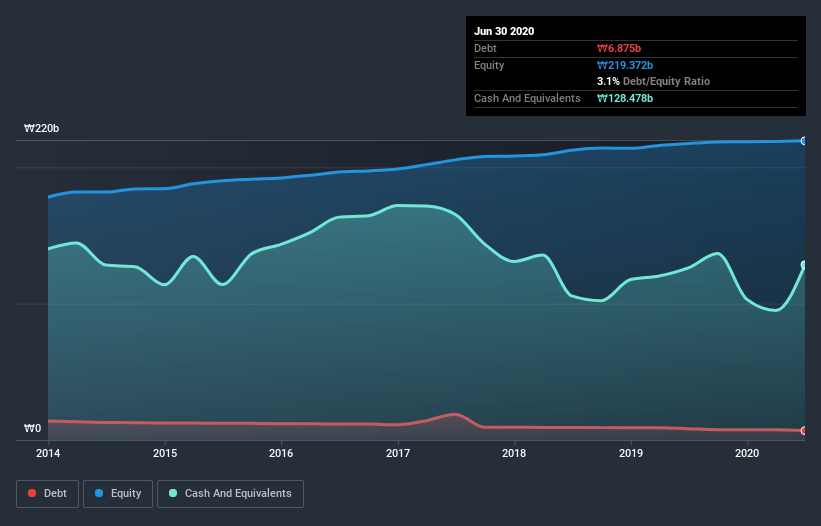- South Korea
- /
- Auto Components
- /
- KOSE:A006660
Is Samsung Climate Control (KRX:006660) Using Debt In A Risky Way?
The external fund manager backed by Berkshire Hathaway's Charlie Munger, Li Lu, makes no bones about it when he says 'The biggest investment risk is not the volatility of prices, but whether you will suffer a permanent loss of capital.' It's only natural to consider a company's balance sheet when you examine how risky it is, since debt is often involved when a business collapses. We can see that Samsung Climate Control Co., Ltd. (KRX:006660) does use debt in its business. But the more important question is: how much risk is that debt creating?
Why Does Debt Bring Risk?
Debt assists a business until the business has trouble paying it off, either with new capital or with free cash flow. If things get really bad, the lenders can take control of the business. However, a more common (but still painful) scenario is that it has to raise new equity capital at a low price, thus permanently diluting shareholders. Of course, debt can be an important tool in businesses, particularly capital heavy businesses. When we examine debt levels, we first consider both cash and debt levels, together.
View our latest analysis for Samsung Climate Control
What Is Samsung Climate Control's Net Debt?
As you can see below, Samsung Climate Control had ₩6.88b of debt at June 2020, down from ₩8.28b a year prior. But on the other hand it also has ₩128.5b in cash, leading to a ₩121.6b net cash position.

How Healthy Is Samsung Climate Control's Balance Sheet?
We can see from the most recent balance sheet that Samsung Climate Control had liabilities of ₩31.3b falling due within a year, and liabilities of ₩4.98b due beyond that. Offsetting these obligations, it had cash of ₩128.5b as well as receivables valued at ₩10.1b due within 12 months. So it actually has ₩102.3b more liquid assets than total liabilities.
This luscious liquidity implies that Samsung Climate Control's balance sheet is sturdy like a giant sequoia tree. On this basis we think its balance sheet is strong like a sleek panther or even a proud lion. Succinctly put, Samsung Climate Control boasts net cash, so it's fair to say it does not have a heavy debt load! There's no doubt that we learn most about debt from the balance sheet. But it is Samsung Climate Control's earnings that will influence how the balance sheet holds up in the future. So when considering debt, it's definitely worth looking at the earnings trend. Click here for an interactive snapshot.
Over 12 months, Samsung Climate Control made a loss at the EBIT level, and saw its revenue drop to ₩68b, which is a fall of 15%. That's not what we would hope to see.
So How Risky Is Samsung Climate Control?
While Samsung Climate Control lost money on an earnings before interest and tax (EBIT) level, it actually booked a paper profit of ₩2.2b. So when you consider it has net cash, along with the statutory profit, the stock probably isn't as risky as it might seem, at least in the short term. The next few years will be important as the business matures. The balance sheet is clearly the area to focus on when you are analysing debt. But ultimately, every company can contain risks that exist outside of the balance sheet. For instance, we've identified 4 warning signs for Samsung Climate Control (1 is a bit concerning) you should be aware of.
If you're interested in investing in businesses that can grow profits without the burden of debt, then check out this free list of growing businesses that have net cash on the balance sheet.
When trading Samsung Climate Control or any other investment, use the platform considered by many to be the Professional's Gateway to the Worlds Market, Interactive Brokers. You get the lowest-cost* trading on stocks, options, futures, forex, bonds and funds worldwide from a single integrated account. Promoted
New: Manage All Your Stock Portfolios in One Place
We've created the ultimate portfolio companion for stock investors, and it's free.
• Connect an unlimited number of Portfolios and see your total in one currency
• Be alerted to new Warning Signs or Risks via email or mobile
• Track the Fair Value of your stocks
This article by Simply Wall St is general in nature. It does not constitute a recommendation to buy or sell any stock, and does not take account of your objectives, or your financial situation. We aim to bring you long-term focused analysis driven by fundamental data. Note that our analysis may not factor in the latest price-sensitive company announcements or qualitative material. Simply Wall St has no position in any stocks mentioned.
*Interactive Brokers Rated Lowest Cost Broker by StockBrokers.com Annual Online Review 2020
Have feedback on this article? Concerned about the content? Get in touch with us directly. Alternatively, email editorial-team@simplywallst.com.
About KOSE:A006660
Samsung Climate Control
Manufactures and sells automotive parts in South Korea and internationally.
Flawless balance sheet and fair value.
Market Insights
Community Narratives




